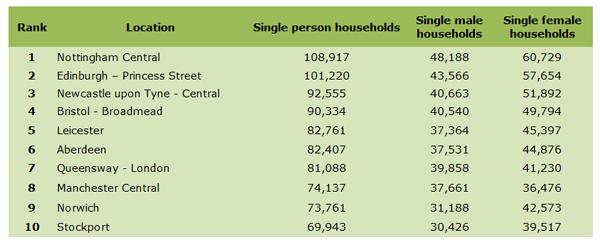With the 2011 Census highlighting over seven million single person households in England and Wales we thought that it be interesting to take a look at who these singletons are and where they are most likely to live by using our Mosaic consumer classifications. Our data reveals that the average single person earns around £35,000, is about 30 years old, shops at Tesco and drives a Volkswagen. Dig a little deeper however and the data also reveals some fascinating insights into where the single households are concentrated (Nottingham, Edinburgh and Newcastle being the hot spots) and reveals four distinct types of single households:
1. Starting Out Singletons
These are younger singles (typically aged between 26 and 30) who own or rent new inner city apartments or small houses on modern estates in places like Harrow, Lewisham and Bristol-Broadmead. They earn on average around £30,000 a year and tend to work in advertising, media, IT, pharmaceuticals and telecoms. Just over a third would describe themselves as having no political party affiliation and despite thinking of themselves as ‘eco-friendly’ they struggle if this means compromising on lifestyle.
2. Struggling Singletons
Aged 18-25 this is the least affluent of the single groups. They are two and half times more likely than average to have an income of less than £10,000 a year earned from unskilled, manual jobs and 60% more likely to be unemployed. Slightly more male dominated than the average singles group they are most likely to live in Birmingham, Newcastle or Manchester in a flat that is almost four times more likely to be council or housing association owned than for the UK population in general. Shopping mostly in local convenience stores they are also far less likely than the average to own a car.
3. Suddenly Singletons
Well paid executives in their early 40s is the typical profile in this group. With household incomes of around £70,000 they are three times more likely than the average UK citizen to shop at Waitrose and also eat out regularly. Professional roles in IT, finance, pharmaceuticals and publishing dominate and they are regulars on the internet – managing finances, checking headlines and networking through sites like LinkedIn. Suddenly Singletons are twice as likely to be divorced than the average and many are also using the internet for dating. Like the Starting Out Singletons Volkswagens are the car of choice but this group is more political with 33% voting Conservative. 70% of this group give to charity and again similar to Starting Out Singletons they are keen to be green but a busy lifestyle often gets in the way.
4. Solus Singletons
This group is mainly elderly, living on private pensions and have downsized to retire to small flats in modern purpose built blocks. The South Coast is the most popular area although Edinburgh also comes high up on the list. They are frequent shoppers – choosing M&S and branded local convenience stores for groceries. Like Suddenly Singletons they are regular givers to charity – especially cancer research and support for the elderly. Although usually Conservative voters they are also 30% more likely than average to vote for a nationalist party and are reluctantly green, many being unconvinced of the benefits.
Top locations for single households
Unsurprisingly, the top locations for single households are in Britain’s major cities, with Nottingham, Edinburgh and Newcastle coming in at numbers one, two and three:

Insight into an evolving population
Towns with the lowest numbers of single households overall are Windsor, Bromsgrove, Aldershot, Hatfield and Stratford-upon-Avon, perhaps as people move out of the bigger cities for retirement or to start a family.
As our lifestyles continue to change, impacted by improved healthcare, better access to information and greater mobility new groups are emerging all the time. Overlaying census data with profiling tools like Mosaic gives us a fascinating insight into these groups, their likes and dislikes as well as likely locations. For marketers it is hugely valuable in helping them develop a deeper understanding of who their customers are and the best ways to communicate with them. It can also play a huge role in helping them to ensure that the campaigns they are creating are impactful, engaging and effective.






